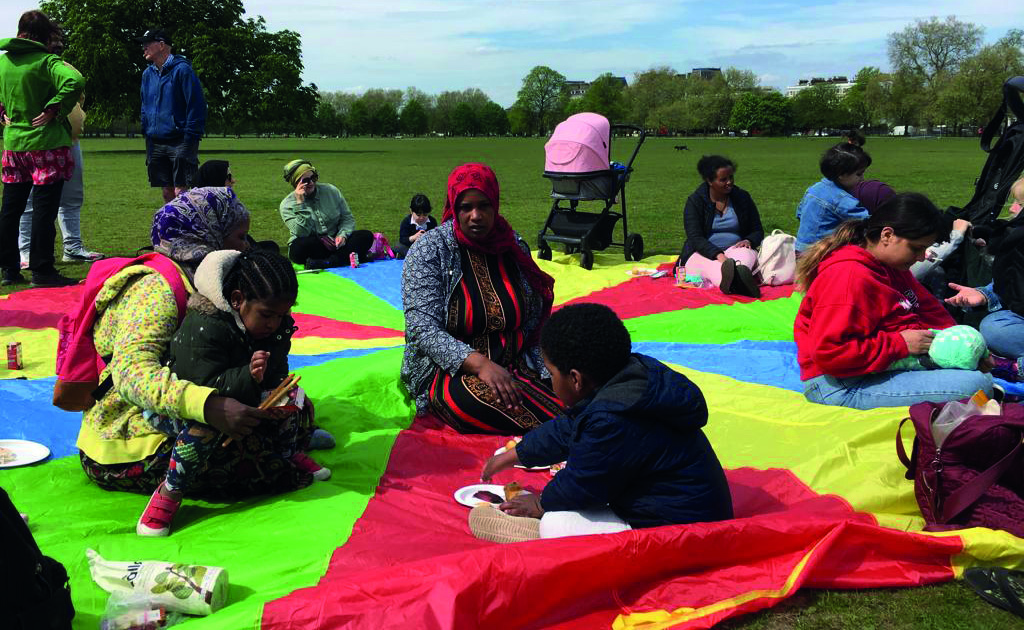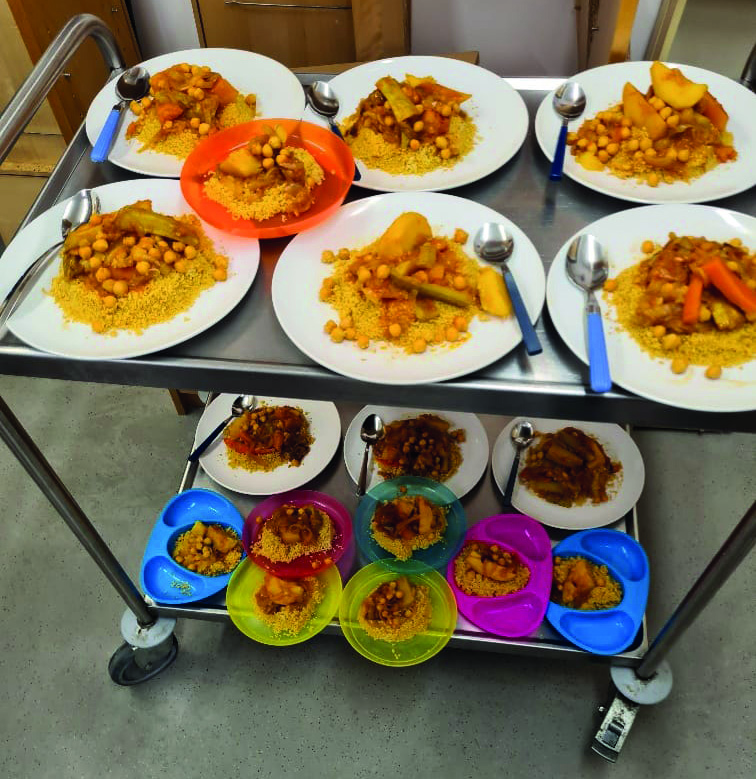
Asylum seekers and refugees face increasing challenges in London today,’ says family learning specialist Foufou Savitzky. ‘Many are confined to very small hotel rooms and have virtually no disposable income to spend on exercise and keeping fit. This is compounded by deep psychological problems which directly impact on their ability to socialise or access services.’
Savitzky is part of the Welcome Project, funded by Lambeth Council, which works with asylum-seeking families who have recently arrived in the UK and are living in two hotels in the south London borough. The programme, delivered by not-for-profit social enterprise Learning Unlimited, runs weekly sessions for migrant families with children under five and expectant parents. In the first half of this year alone, the project has supported around 120 adults and children from countries including Yemen, Afghanistan, Eritrea, Kuwait, Bahrain and Albania who have escaped repressive regimes, persecution, war and poverty. Learning Unlimited's work led to it winning an award in the recent Family Learning Awards by Campaign for Learning.
SURVIVAL MODE
 These displaced families know they may be relocated at any time. But, while the hotels are intended to provide temporary accommodation for around six months, some families live there for up to two years. ‘Children and their parents need to develop resilience because they can be settled into school and nursery only to be told that they are being transferred far away and have to start that process again,’ says family learning specialist Sarah Rees. ‘This is on top of the trauma they have already experienced.’
These displaced families know they may be relocated at any time. But, while the hotels are intended to provide temporary accommodation for around six months, some families live there for up to two years. ‘Children and their parents need to develop resilience because they can be settled into school and nursery only to be told that they are being transferred far away and have to start that process again,’ says family learning specialist Sarah Rees. ‘This is on top of the trauma they have already experienced.’
Savitzky elaborates, ‘Some of the children have lived through war, while others were born in other European countries and have spent two years of their life travelling to get to the UK. Many of them came on those little boats that we hear so much about.’ (See Case study).
As the name suggests, the Welcome Project aims to give families a friendly and welcoming place to escape to and meet others living in the same situation, along with professionals and volunteers. It is accessed on a weekly standalone basis to factor in families being moved on and newcomers joining.
The programme's model is loosely based around a typical nursery session, with project tutors leading creative activities, outdoor play, story and song times, and the session ending with a meal. Perhaps the main difference is that parents and other significant adults attend and are as much the focus as the children. People form communities within the hotels, so the project has evolved to welcome anybody who plays an important role in the child's life, which can include parents and grandparents who have become separated from their own children. ‘It is very important that we recognise and build on those relationships,’ says Savitzky.
Attachment and the relationships between adult and child are emphasised in the sessions because a lot of parents are themselves traumatised and depressed. ‘How do parents engage and play with their children when they are in survival mode?’ adds Rees.
‘It is wonderful to watch the transition from a mother who may be sat looking at her phone and keeping her distance as her boy stands at a tuff tray throwing toys, to when we're singing and he's playing a drum and she's excited and happy to see that. It's a beautiful achievement.’
HIDDEN TRAUMA
When planning the sessions, tutors need to be mindful of what the children have experienced. ‘A trip to the seaside sounds fun, but can be quite traumatic for some children because of how they arrived in the country. We have to be careful about stories and songs we introduce; ‘Row, Row, Row Your Boat’ isn't appropriate,’ says Savitzky.
‘An emergency helicopter landed in the park by our centre and a little child became hysterical. Her parents explained that she had witnessed a lot of aeroplanes and helicopters during the war.’
Tutors also need to be conscious of the constraints families face, with limited clothing and laundry facilities making it tricky to offer activities such as messy play or painting. ‘We constantly have to review what is traditionally seen as good practice,’ says Savitzky.
The programme provides the opportunity to share key health and wellbeing topics with parents who have often left behind the support system of families and communities that they relied on to help raise their children. Rees adds that providing advice on healthy eating and oral health is also important.
The sessions enable adults and children to learn English in an informal setting, with emphasis given to key language to support engagement with education and health professionals. Staff help parents to complete forms for further support, including nursery and school places. They also link them to the local baby bank for clothing and resources, such as baby baths and prams, and have set up a monthly clothes bank for adults.
FOOD AND FAMILY
 One of the biggest issues that families living in the hotels report is coping without kitchen facilities. They are provided with food, typically microwaved ready meals, to eat in their hotel rooms, often sat on the floor or beds.
One of the biggest issues that families living in the hotels report is coping without kitchen facilities. They are provided with food, typically microwaved ready meals, to eat in their hotel rooms, often sat on the floor or beds.
‘The food is everyone's complaint, they rate it zero,’ says Rees. ‘It is culturally not the food they are used to and many people say it is spicy but not nicely so. Children are becoming very fussy eaters.’
The social importance of preparing food and sitting down to share a meal with family and friends led to hot meals being provided at each session. These are freshly prepared by volunteer asylum-seeker adults.
Rees and Savitzky regard the sessions as a ‘community hub’ where families can share childhood stories, put on their music or prayer call and enjoy them together. The Welcome Project's impact on families is so great that relocated families stay in touch, facetime during sessions and even travel back to continue the special bonds they have formed.
CASE STUDY: Mustafa
Three-year-old Mustafa* was born in the Middle East into a persecuted minority group. Mustafa and his family's lives were at risk so his parents, Asma and Maaz, decided to travel to the UK. His sister was born as they travelled through Scandinavia.
They arrived in the UK by small boat during the pandemic and spent time at a ‘reception’ centre on the south coast before being placed in a hotel for asylum seekers in south London. There they continue to live in one room. Meals and laundry are provided and they receive £8 a week per person for all other expenses, including clothing. There are no communal areas, so children play in the corridors or the hotel yard beside a busy road. It's difficult to establish sleep routines.
Their first months at the hotel were made even tougher by lockdowns. As restrictions eased, they could leave the hotel, but were afraid to go far.
Then they heard about the Welcome Project. Asma and Maaz were very quiet when they first started to attend. They needed a lot of encouragement to help their children join in activities and probably didn't understand the purpose of them or the project's expectations of parents. Mustafa flitted from toy to toy and spent a lot of time fighting.
But, over time, they became more engaged with the activities and began to interact with other families and the project tutors. Mustafa started to concentrate more and join in group activities, demonstrating a particular interest in dinosaurs. He made huge progress, especially emotionally and in his use of English. In one session alone he acquired the words ‘penguin’, ‘shark’ and ‘octopus’, with his parents ensuring that he also learnt them in Arabic.
Shortly after Mustafa turned three, he started nursery school on a part-time basis but always asks his parents to bring him to the Welcome Project afterwards. Asma and Maaz continue to attend with their daughter and are very clear that attending the project has hugely benefited them all.
*names have been changed









